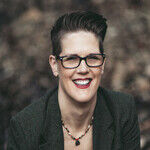I grew up talking like Nancy Drew. "Yuck!" I'd exclaim. "So?" "Oh, no!" Then I moved to New York after college, and suddenly I started talking like grandparents. "Feh!" I'd exclaim. "Blech!" "Oy!"
Blame it on the bagels, on Brooklyn! Something in the air made me reclaim my Jewish heritage. Thank God, a little help I had:
Leo Rosten.
Rosten died 20 years ago ("Oy!"), but his seminal work, "The Joys of Yiddish," will keep folks like me talking like folks like him forever. In fact, you don't even have to be Jewish to love Leo's wry way with words.
Why whine when you can kvetch? Or gloat when you can kvell? Why squash when you can gleefully put the kibosh on something? Rosten made people love Yiddish by explaining the words with jokes. Take "bubeleh" — the Yiddish equivalent of "sweetie" or "munchkin."
A Jewish mother sent her son off to his first day in school with the customary pride and precautionary advice. "So, bubeleh, you'll be a good boy and obey the teacher? And you won't make noise, bubeleh, and you'll be very polite and play nice with the other children. And when it's time to come home, you'll button up warm, so you won't catch cold, bubeleh. And you'll be careful crossing the street and come right home..." etc. etc.
Off went the little boy.
When he returned that afternoon, his mother hugged him and kissed him and exclaimed, "So did you like school, bubeleh? You made new friends? You learned something?"
"Yeah," said the boy. "I learned that my name is Irving."
Now, the sneaky thing about Rosten's book is that even his (ancient) jokes taught me more about being Jewish — about laughing at your troubles, standing up for the underdog and thumbing your nose at the high and mighty. Just look how this next joke does all three. In defining "schnorrer," which can mean "beggar" or "cheapskate," Rosten's self-possessed indigent knocks on the door of a rich man at 6:30 in the morning. "How dare you wake me up so early?" the rich man cries. "Listen," replies the schnorrer. "I don't tell you how to run your business, so don't tell me how to run mine."
Well, thank goodness nobody told Rosten how to run his business, because that way he did it all. Born in Lodz, Poland, in 1907, he came to America as a tot and quickly earned fame and chuckles with his 1937 novel, "The Education of H*Y*M*A*N K*A*P*L*A*N." A flamboyant mangler of the English language, Kaplan was based on one of Rosten's own night school students.
But success didn't mean Rosten spent his life just chronicling Hyman's high jinks. He penned two sequels, screenplays, sociological studies and adventure novels. He also compiled "Leo Rosten's Giant Book of Laughter," a less than scholarly tome, perhaps, but by mentioning it, I now have an excuse to quote you one of my favorite jokes:
The new arrival at the summer resort sat down in a beach chair. "I got up at dawn," he boasted, "to see the sunrise." "You soitenly picked the right time," said his neighbor.
Well, anyway. Undoubtedly, it is his Yiddish lexicon (and not that joke) that ensure Rosten his immortality. By defining nosh, schlep and chutzpah, he not only kept those words alive but also made them accessible to the generation that otherwise gleans its Yiddish from "Seinfeld," other sitcoms and "Saturday Night Live."
Rosten may have gone to that great melting pot in the sky, but the language he loved has become part and parcel of the country he loved, too. You could say they go together like a bagel and a schmear.
Lenore Skenazy is author of the book and blog "Free-Range Kids" and a hilarious keynote speaker at conferences, companies and schools. Run out and get her book "Has the World Gone Skenazy?" To learn more about Lenore Skenazy ([email protected]) and read features by other Creators Syndicate writers and cartoonists, visit the Creators Syndicate webpage at www.creators.com.






View Comments